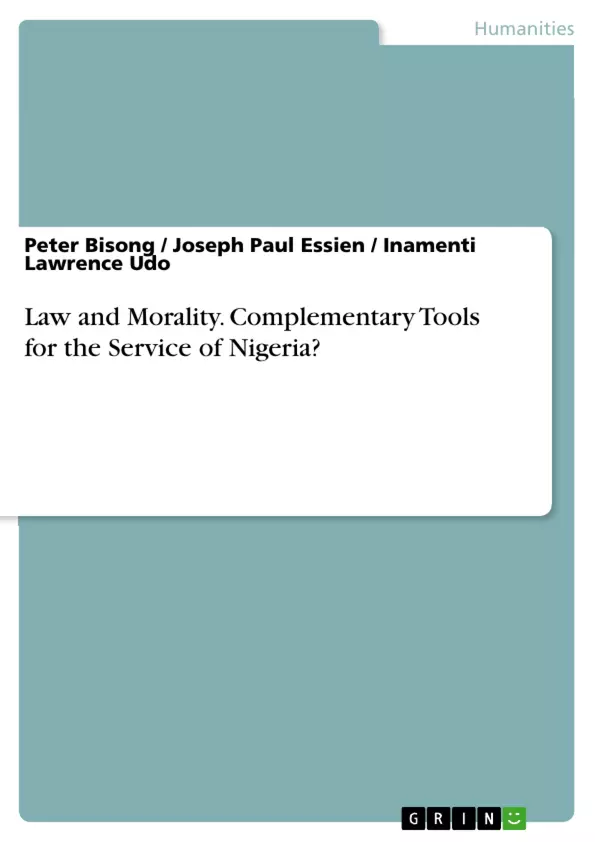Nigeria is a country that bribery, corruption and lawlessness reign supreme. This is the reason why the country has always been named among the most corrupt countries in the world.
The establishment of EFCC and ICPC gave hope to many concerned Nigerians, that corruption has finally been given its long overdue attention in the country. These efforts at combating corruption have however failed for corruption and other social ills go on apace with no signs that their end is near.
It is for this reason that we believe, that the law alone cannot bring sanity to the Nigerian social system. It is the dearth of morality that has made Nigeria the way it is. This is shown by the fact that Nigerians hail greedy and corrupt politicians as heroes and gives them chieftaincy titles and awards – pointing to an alarming moral emptiness in most Nigerians. This shows that Nigeria has lost the basic sense of what is right and wrong. The social state of Nigeria shows glaringly that law and morality must go together for a country to walk straight.
This incidentally is the thesis of this work. Law and morality are inseparable entities in any social setting. Attempt to separate them would lead the country to experience what Nigeria is experiencing at present. We would argue in this work that a better Nigeria would only emerge if morality is made to co-exist alongside law. This responsibility we believe falls heavily on the various religious bodies as well as the government.
Inhaltsverzeichnis (Table of Contents)
- Introduction
- What is Law?
- What is Morality?
- The Relation between Law and Morality
- Law and Morality as Complementary Tools
- Conclusion
Zielsetzung und Themenschwerpunkte (Objectives and Key Themes)
This work argues that law and morality are inseparable entities and that a better Nigeria would only emerge if morality coexists alongside law. The authors aim to demonstrate that the current state of corruption and lawlessness in Nigeria is a result of the breakdown of moral values. They contend that a focus on strengthening moral principles, alongside legal frameworks, is essential for creating a more just and equitable society.
- The interconnectedness of law and morality in shaping societal behavior
- The prevalence of corruption and lawlessness in Nigeria
- The role of morality in addressing social ills
- The responsibilities of religious bodies and government in fostering morality
- The limitations of legal frameworks in the absence of strong moral principles
Zusammenfassung der Kapitel (Chapter Summaries)
- Introduction: This chapter sets the stage by highlighting the prevalence of corruption, bribery, and lawlessness in Nigeria, arguing that the country's social system is plagued by a lack of morality. The authors suggest that the establishment of anti-corruption bodies like EFCC and ICPC has been insufficient in addressing these issues.
- What is Law?: This chapter explores various definitions of law from different schools of jurisprudence. It highlights the difficulty in providing a universally accepted definition and ultimately adopts a definition that emphasizes the role of law in shaping behavior and resolving conflicts.
- What is Morality?: This chapter delves into the nature and significance of morality. It explores different perspectives on how morality shapes individual behavior and societal values. This chapter likely examines the relationship between morality, ethics, and personal conduct.
- The Relation between Law and Morality: This chapter investigates the complex interplay between law and morality. It likely examines how moral principles influence the development and enforcement of legal systems. This chapter may also discuss the limitations of law in achieving social justice without a strong moral foundation.
- Law and Morality as Complementary Tools: This chapter provides a detailed analysis of the authors' central argument: that law and morality must work together to create a better Nigeria. It likely discusses the specific strategies and actions required to achieve this goal.
Schlüsselwörter (Keywords)
This work centers on the crucial relationship between law and morality in the context of Nigeria. Key concepts include corruption, lawlessness, moral decay, social ills, and the importance of promoting ethical values alongside legal frameworks. The text also emphasizes the roles of religious bodies and government in fostering a morally sound society.
Frequently Asked Questions
What is the central thesis regarding law and morality in Nigeria?
The thesis argues that law and morality are inseparable; the law alone cannot resolve Nigeria's social issues like corruption without a strong moral foundation.
Why have anti-corruption bodies like EFCC and ICPC struggled?
The authors suggest these efforts fail because corruption and lawlessness continue due to a "moral emptiness" where society often hails corrupt individuals as heroes.
How does the work define the relationship between law and morality?
They are viewed as complementary tools. Law shapes behavior and resolves conflict, while morality provides the ethical framework necessary for the law to be effective.
Who is responsible for fostering morality in Nigeria?
The responsibility falls heavily on both various religious bodies and the government to promote ethical values alongside legal frameworks.
What does the work say about the current social state of Nigeria?
Nigeria is described as a country where bribery and lawlessness reign, largely because the basic sense of right and wrong has been lost in the social system.
- Arbeit zitieren
- Peter Bisong (Autor:in), Joseph Paul Essien (Autor:in), Inamenti Lawrence Udo (Autor:in), 2017, Law and Morality. Complementary Tools for the Service of Nigeria?, München, GRIN Verlag, https://www.grin.com/document/379512



